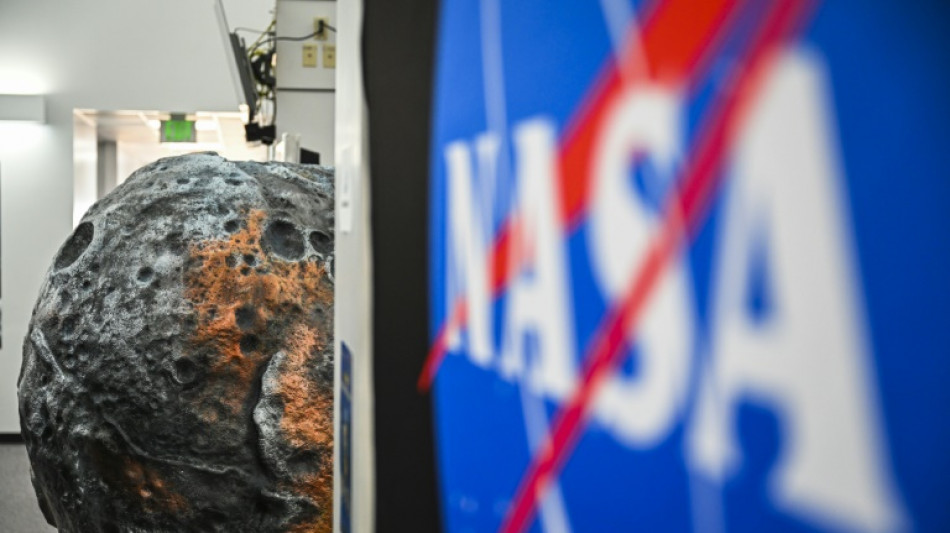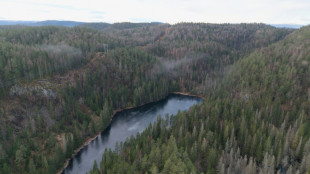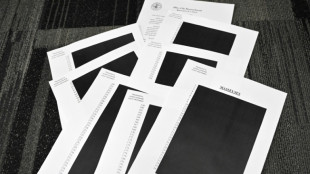
-
 FIFA Best XI 'a joke' rages Flick over Raphinha snub
FIFA Best XI 'a joke' rages Flick over Raphinha snub
-
Swiss Von Allmen pips Odermatt to Val Gardena downhill

-
 Vonn claims third podium of the season at Val d'Isere
Vonn claims third podium of the season at Val d'Isere
-
India drops Shubman Gill from T20 World Cup squad

-
 Tens of thousands attend funeral of killed Bangladesh student leader
Tens of thousands attend funeral of killed Bangladesh student leader
-
England 'flat' as Crawley admits Australia a better side

-
 Australia four wickets from Ashes glory as England cling on
Australia four wickets from Ashes glory as England cling on
-
Beetles block mining of Europe's biggest rare earths deposit

-
 French culture boss accused of mass drinks spiking to humiliate women
French culture boss accused of mass drinks spiking to humiliate women
-
Burning effigy, bamboo crafts at once-a-decade Hong Kong festival

-
 Joshua knocks out Paul to win Netflix boxing bout
Joshua knocks out Paul to win Netflix boxing bout
-
Dogged Hodge ton sees West Indies save follow-on against New Zealand

-
 England dig in as they chase a record 435 to keep Ashes alive
England dig in as they chase a record 435 to keep Ashes alive
-
Wembanyama 26-point bench cameo takes Spurs to Hawks win

-
 Hodge edges towards century as West Indies 310-4, trail by 265
Hodge edges towards century as West Indies 310-4, trail by 265
-
US Afghans in limbo after Washington soldier attack

-
 England lose Duckett in chase of record 435 to keep Ashes alive
England lose Duckett in chase of record 435 to keep Ashes alive
-
Australia all out for 349, set England 435 to win 3rd Ashes Test

-
 US strikes over 70 IS targets in Syria after attack on troops
US strikes over 70 IS targets in Syria after attack on troops
-
Australian lifeguards fall silent for Bondi Beach victims

-
 Trump's name added to Kennedy Center facade, a day after change
Trump's name added to Kennedy Center facade, a day after change
-
West Indies 206-2, trail by 369, after Duffy's double strike

-
 US strikes Islamic State group in Syria after deadly attack on troops
US strikes Islamic State group in Syria after deadly attack on troops
-
Awake Breast Augmentation: Gruber Plastic Surgery Highlights Live Implant Sizing Under Local Anesthesia With No Sedation for Eligible Patients

-
 Epstein files opened: famous faces, many blacked-out pages
Epstein files opened: famous faces, many blacked-out pages
-
Ravens face 'special' Patriots clash as playoffs come into focus

-
 Newly released Epstein files: what we know
Newly released Epstein files: what we know
-
Musk wins US court appeal of $56 bn Tesla pay package

-
 US judge voids murder conviction in Jam Master Jay killing
US judge voids murder conviction in Jam Master Jay killing
-
Trump doesn't rule out war with Venezuela

-
 Haller, Aouar out of AFCON, Zambia coach drama
Haller, Aouar out of AFCON, Zambia coach drama
-
Nasdaq rallies again while yen falls despite BOJ rate hike

-
 Bologna win shoot-out with Inter to reach Italian Super Cup final
Bologna win shoot-out with Inter to reach Italian Super Cup final
-
Brandt and Beier send Dortmund second in Bundesliga

-
 Trump administration begins release of Epstein files
Trump administration begins release of Epstein files
-
UN Security Council votes to extend DR Congo mission by one year

-
 Family of Angels pitcher, club settle case over 2019 death
Family of Angels pitcher, club settle case over 2019 death
-
US university killer's mystery motive sought after suicide

-
 Rubio says won't force deal on Ukraine as Europeans join Miami talks
Rubio says won't force deal on Ukraine as Europeans join Miami talks
-
Burkinabe teen behind viral French 'coup' video has no regrets

-
 Brazil court rejects new Bolsonaro appeal against coup conviction
Brazil court rejects new Bolsonaro appeal against coup conviction
-
Three-time Grand Slam winner Wawrinka to retire in 2026

-
 Man Utd can fight for Premier League title in next few years: Amorim
Man Utd can fight for Premier League title in next few years: Amorim
-
Pandya blitz powers India to T20 series win over South Africa

-
 Misinformation complicated Brown University shooting probe: police
Misinformation complicated Brown University shooting probe: police
-
IMF approves $206 mn aid to Sri Lanka after Cyclone Ditwah

-
 Stocks advance as markets cheer weak inflation
Stocks advance as markets cheer weak inflation
-
Emery says rising expectations driving red-hot Villa

-
 Three killed in Taipei metro attacks, suspect dead
Three killed in Taipei metro attacks, suspect dead
-
Seven Colombian soldiers killed in guerrilla attack: army


NASA journeys to the metal-rich asteroid Psyche
It's a world like no other: a metal-rich asteroid that could be the remnants of a small planet, or perhaps an entirely new type of celestial body unknown to science.
A NASA spacecraft blasted off from the Kennedy Space Center Friday bound for Psyche, an object 2.2 billion miles (3.6 billion kilometers) away that could offer clues about the interior of planets like Earth.
"We're going to learn all kinds of new things, how these things fly through the solar system, and they hit each other and they cause the evolution of what we have today, our solar system," NASA chief Bill Nelson said shortly before lift off at 10:19 am Eastern Time (1419 GMT) on a reusable SpaceX Falcon Heavy rocket.
"We've visited either in person or robotically worlds made of rock, worlds made of ice and worlds made of gas... but this will be our first time visiting a world that has a metal surface," lead scientist Lindy Elkins-Tanton told reporters during a briefing this week.
Trailing a blue glow from its next-generation electric propulsion system and flanked by two large solar arrays, the van-sized probe should arrive at its destination in the Asteroid Belt, between Mars and Jupiter, in July 2029.
- Studying cores of rocky planets -
Over the course of two years, it will deploy its suite of advanced instruments to probe Psyche for evidence of an ancient magnetic field and to study its chemical and mineral composition, as well as topography.
Scientists think Psyche, named after the goddess of the soul in Greek mythology, could be part of the iron-nickel core of a "planetesimal," a building block of all rocky planets, that was left exposed after an ancient collision blasted off the exterior.
It could also be something else -- a primordial solar system object that's never been documented before.
"This is our one way to see a core," said Elkins-Tanton. "We say tongue in cheek that we're going to outer space to explore inner space."
Psyche is thought to have an irregular, potato-like shape, measuring 173 miles (280 kilometers) across at its widest point -- though it's never actually been seen up close.
Until recently, scientists thought it was overwhelmingly composed of metal -- but analyses based on reflected radar and light now indicate that metal probably comprises between 30-60 percent, with the rest being rock.
- Solar electric propulsion -
The mission will include several technological innovations.
The Psyche spacecraft, named after the asteroid, will test out next generation communications based on lasers -- a step NASA compares to upgrading old telephone lines on Earth to fiber optics.
Deep Space Optical Communications, as the system is called, "was designed to demonstrate 10 to 100 times the data-return capacity of state-of-the-art radio systems used in space today," said Abi Biswas of NASA's Jet Propulsion Laboratory in a statement.
Psyche also uses a special kind of propulsion system called "Hall-effect thrusters" that harnesses the energy from solar panels to create electric and magnetic fields that, in turn, expel charged atoms of xenon gas.
The thrust it exerts is roughly equal to the weight of an AA battery in your hand. But in the void of space, the spacecraft will accelerate continuously to tens of thousands of miles per hour.
Such systems avoid the need to carry thousands of pounds of chemical fuel into space, and Psyche will be the first time they are used beyond lunar orbit.
Th.Berger--AMWN



